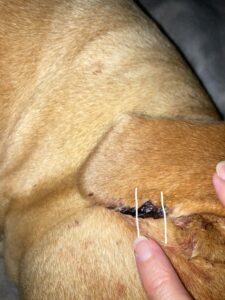This question came in to Ask a Bunbury Vet recently:
Our dog has a lump/scab on the edge of her ear. I initially thought it may have been from flies biting. We took her to the vet and they weren’t sure what it was from but said they need to surgically remove it.
We did get a quote but was wondering for something like this, how much it would likely cost as we were quite shocked with the quote.
She is a ridgeback/staffy (weighs 35kgs) and we are aware it will be required to be done under anaesthetic.
I’ve attached a pic… that is my little finger nail in the pic to show size.
It is the full thickness of her ear, sore is on both sides of the edge if that makes sense.
We’ve already tried an antibiotic topical cream, warm salty water, diluted Betadine with no change.
Thanks in advance.
That is fresh blood as after she was examined she sh ook her head and it started bleeding. The white lines are to show the size better of the actual sore
ook her head and it started bleeding. The white lines are to show the size better of the actual sore
 ook her head and it started bleeding. The white lines are to show the size better of the actual sore
ook her head and it started bleeding. The white lines are to show the size better of the actual soreThe Answer from Dr Braden, Bunbury and Eaton Vet Clinics:
My first thought looking at this would be fly/insect hypersensitivity. I would be wanting to get an accurate diagnosis before looking to remove part of the ear. Without physically examining it, I can’t be sure what it is, but I would ensure fly/insects are ruled out completely before doing surgery on an ear. I would be allpying insect repellant cream twice daily, keeping the dog indoors in the late afternoon/evening and night as mosquitoes and midges can cause this as well.
Ear surgery is not without possible complications. The blood supply to the ear is poor, so healing can be slow and issues can arise. It’s more challenging to remove an ear mass than one on the body.
As for costs, it does depend on what is included. for example, if the estimate includes the lab work that may add $250-300 to the bill (if a lump is being removed it should go to the lab to check diagnosis and ensure complete removal). Quality vet care isn’t cheap, so what may seem crazy may just be the cost of doing the job in a high quality way. Our job as vets is to be an advocate for the animals, so we will offer what we see as the best option to optimise outcomes for the pet. If it’s beyond what someone is able or willing to pay, we can offer alternatives, but these often come with compromises.
